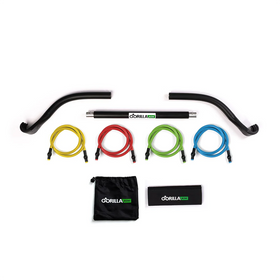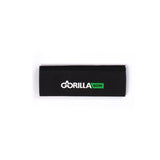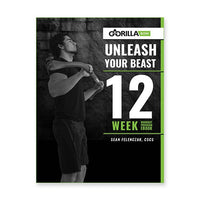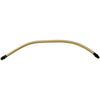Protein Before or After Workout: Which is Better?

Warm-ups are the appetizer, your routine is the main course, and the cooldown is the side dish. That makes the post-workout protein shake or bar the dessert to round out your balanced diet.
If you frequently exercise, you probably know the importance of a high protein diet, especially if you’re lifting. But the timing of when you should consume the most protein is a highly contested topic. Many people swear that the best time to eat is before you get some gains, but others think it’s purely meant as a post-workout reward.
Let’s uncover the answer once and for all. Is protein better before or after a workout?
The Importance of Protein
If you’re frequently working out in any capacity, protein is essential. If you’re not supplementing your diet with high protein sources, you might not see the results that you’re looking for when trying to encourage muscle growth.
Protein can boost glycogen storage, which is what the body breaks down and turns into glucose in order to gain energy. This is why some people think protein before a workout is the better option, as they believe it might be able to fill your personal gas tank.
It also helps reduce muscle soreness and promotes muscle repair. When you lift, your muscles microtear, forcing your body to send important nutrients to heal it. Over time, these accumulate to form muscle mass. Protein helps speed up this process, which is why many people think you should eat it after a workout when building muscle.
You can get protein from meats like chicken or fish, but you can also get it from plants like soybeans, garbanzo beans, or nuts. Incorporating protein into your diet is essential for muscle protein synthesis.
When To Eat Protein
You can’t talk to bodybuilders or athletes without them mentioning the “anabolic window.” This is a short time period post-exercise where it’s believed that your muscle tissues are more absorbent and receptive to protein. Many people think it lasts about thirty minutes after you’re all finished.
Some think that your body will not use protein as effectively if you fail to take it outside of this period, so you should load up right then and there. However, research has found that the anabolic window is much longer than thirty minutes, and it might not even be limited to post-exercise activity.
A group of sports medicine researchers put this to the test by splitting 21 men into two groups. One group received a 25-gram shake before their workout, while the other group was given the same shake after their workout. Both groups completed the same whole-body workout over a ten-week period.
The results might disappoint some diehard protein timing fanatics. The researchers found no significant difference in muscle strength or size following the end of the study, whether the shake was a pre-workout or post-workout shake.
With this in mind, you can safely assume that taking workout meals before or after a workout is equally effective. While this might be a disappointing answer for the diehard post-workout fanatics, this is actually good news because it gives you more freedom when it comes to taking your favorite protein shakes.
In fact, studies that have tested the effectiveness of taking protein near a workout have concluded with mixed results. The general consensus is that your total protein intake every day might actually be a lot more important.
How Much Protein Do I Need?
When you look at the nutrition label of your protein bar to make sure it doesn’t have any harmful trans fats, you can also take a look at the amount of protein. You might notice that a 20g protein bar is 40% of the Recommended Daily Allowance (RDA). While this seems like a lot to be taking in such a small snack, it’s not entirely accurate.
These guidelines are based on sedentary lifestyles, meaning that if you don’t work out or exercise often, this is the recommended breakdown of each nutrient you should be consuming. But when you’re working out often, you need more grams of protein to effectively build your muscle.
The recommended protein intake for sedentary men and women is 0.36 grams per pound of body weight. However, research suggests that people who routinely strength train might need as much as double the RDA, or 0.72 grams per pound of bodyweight. For a 150 pound man, this is 109 grams a day.
With that in mind, it is possible to over-consume protein and start gaining weight. This is because if your body has extra protein, it converts it to fat. So, you should keep your protein shakes and bars to a minimum and try to supplement your protein through a healthy diet.
Pre-Workout vs. Protein
Despite the fact that the timing of your protein intake doesn’t seem to matter very much, most people’s workout rituals include a nice shake or bar after their workout is complete. But many people also choose to use pre-workout supplements before they workout. What’s the difference? And should you use pre-workout?
Pre-workout is a supplement that usually contains things like a dose of amino acids, creatine, taurine, and caffeine to boost your energy levels and focus throughout the workout itself. You can think of them as more of a performance enhancer, whereas protein is more of a results enhancer.
Pre-workouts can be beneficial and safe to use as a part of your workout routine as long as you make sure the ingredients are safe and the company is credible. However, as their name implies, there is no debate as to when you should take them.
Become a Protein Pro
If you still like the ritual of stocking up on a protein shake before or after your workout, go right ahead. However, keep in mind that protein bars and shakes are mostly artificial. You might be better off with some natural protein products for your pre-workout snack.
Some really great protein-filled snacks include:
- Nuts (or nut butters like peanut butter)
- Greek yogurt
- Hard-boiled eggs
- Hummus
- Edamame
- Bananas
- Oats (like oatmeal)
- Berries
These are also filled with healthy carbs and can be the perfect way to give you a boost of energy before a workout.
As far as what to eat when you’re not working out, it’s always important to incorporate protein into your meals. One of the best ways to do this is just by eating meat. Though the type of meat matters. You’ll want to go for lean meats that are lower in fat, such as chicken, fish, or turkey, as opposed to fatty pork or beef.
Since a lot of protein comes from meats and dairy products, you need to take extra care if you’re a vegan to make sure you’re getting the appropriate amounts per day. Tofu is a popular alternative to meat, but you can load up on plant-based protein powders made from soy or green peas to avoid lactose.
The Power of Protein
You can’t have a conversation with any fitness fanatic without bringing up the age-old debate: when should you take protein? And despite some diehards belonging to one side over the other, it turns out this whole debate has been for nothing.
That’s because research shows it really doesn’t matter when you take your protein as long as you’re getting enough of it. For people who are actively engaging in strength training, you might need as much as double the Recommended Daily Allowance, or 0.72 grams per pound of bodyweight.
Just remember that the type of protein you’re eating is just as important as the amount. While protein shakes and bars are a nice treat every now and then, you’re not really getting any other nutrients from them. Consider getting most of your protein through meats, cheeses, soybeans, greek yogurt, and nuts.
If you want to enjoy all of that delicious protein, you’re going to need a killer workout to make it all worth it. Or what about unlimited killer workouts? The Gorilla Bow All-Access Membership gives you access to on-demand and live fitness classes that will help you get the most out of your Gorilla Bow to maximize your gains.
Sources:
Nutrition for sport and exercise | British Nutrition Foundation .
How Microtears Help You to Build Muscle Mass | University Hospitals
Nutrient timing revisited: is there a post-exercise anabolic window? | NCBI
Pre- versus post-exercise protein intake has similar effects on muscular adaptations | NCBI










Leave a comment